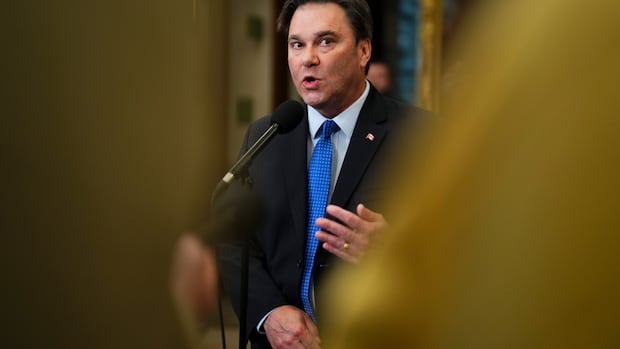The union representing Ontario’s wildland firefighters says they’re working long hours that are contributing to “fatigue,” and is calling for a funding increase to address a lack of resources.
“Historically Ontario’s had about 180 four-person fire crews,” said Noah Freedman, a wildfire crew leader in northwestern Ontario and vice-president of Local 703 of the Ontario Public Service Employees Union (OPSEU).
“That’s not accounting for all the changes,” he said. “Things are getting hotter, seasons are getting longer, a little drier.
“While we should be looking to staff more firefighters, and have more water bombers and pilots and all of our incredible support staff that we need more of, we’re just going the other direction at the moment.”
Freedman said the union has been unable to confirm the exact number of crews currently operating; last year, there were 143.
“To be honest, it weighs on you,” Freedman said. “There’s a lot of fatigue in this job. And as summers go on and fires get more intense with the heat, so too does our fatigue. And then there’s poor decision-making because people just don’t get breaks.”
Freedman, for example, first deployed into the region to fight wildfires in late April. When he spoke to CBC News on Wednesday, he’d just completed his third 19-day rotation (with two days off between stints).
The province is also short water bomber pilots.
Freedman said three Ontario water bombers are grounded at any one time due to a lack of pilots.
“We go to a fire, it’s way too big for one crew or even two crews to handle,” he said. “There’s no water bombers available because they’re either busy or we don’t have enough of them, and so everyone’s kind of pushing not just out of their comfort zone, but out of their traditional training.
“As resources dwindle, you just kind of start getting into that mindset of like, ‘OK, well, we have to figure out a way to make this work.’ And the more we do that, the more we kind of push those limits, especially with the lack of experience that we have — that’s when mistakes start happening.”
Freedman said the current budget for Ontario’s wildfire program is $130 million.
“It might sound like a lot of money to folks, but to be honest, in a program with this many aircraft and personnel … that covers a wildland fire region double the size of France, $130 million just keeps the lights on,” he said. “To put it in perspective, [Premier] Doug Ford spent $103 million on commercials last year.
We really need to start thinking about proactively funding the program so that we can buy things before we need them, whether that’s aircraft or even paying our pilots more so that we can actually fly the water bombers we own, much less buy new ones.– Noah Freedman, wildfire crew leader, union local VP
“We really need to start thinking about proactively funding the program so that we can buy things before we need them, whether that’s aircraft or even paying our pilots more so that we can actually fly the water bombers we own, much less buy new ones.”
Freedman said the union would like to see the budget boosted to $300 million, adding the program is usually over budget, with between $200 million and $250 million in spending.
That, he said, is all reactionary spending — not proactive spending.
Contacted by CBC News for comment, a Ministry of Natural Resources (MNR) spokesperson said in an email that the province has increased investments in the wildland fire management program by 92 per cent since 2018.
The reclassification issue
Another outstanding issue is the union’s push to have wildland fireflighters reclassified as firefighters, instead of resource technicians, which would allow them to receive higher wages and better benefits.
Last month, MNR spokesperson Emily McLaughlin said in an email that “the reclassification work has been completed and the government has been waiting for OPSEU to sign the agreement since early April. We are prepared to implement the reclassification changes immediately.”
However, Freedman said the situation is more complicated.
“The way to put it is that the government found a very, very clever loophole so that they can essentially say, ‘Look, we’re reclassifying the firefighters, we did it, It’s everything they wanted.’ But it’s absolutely not,” he said.
“All they’ve done is rebranded our job title and given us, I think it’s like a $3-an-hour raise. And people can’t make a career in this job with a with a $3-an-hour raise given how many issues we have.”
MPP raises crew leader ‘safety issue’
Thunder Bay-Superior North NDP MPP Lise Vaugeois said the province has eliminated many of the full-time wildland firefighter jobs, instead hiring workers for the fire season.
That, she said, means firefighters aren’t able to get the experience needed to be crew leaders.
“My very first conversation with a wildlife firefighter just shortly after I was elected, he said to me at the time, it takes five to seven years of experience to become a crew leader,” Vaugeois said. “They don’t have enough experienced crew leaders.
“You’ll have people, university students doing these jobs, or college students or whatever, young people, and they may have come back for two or three years,” she said. “That’s not enough to be a crew leader, but they are going to be pushed into those positions whether they’re ready for them or not. And that’s a very serious safety issue.”
Freedman said experience is important when fighting wildfires.
“The average age [of firefighters], let’s say these days, is like 21,” he said. “There’s a lot less critical thinking ability there. It’s not that they’re not brilliant young people, but there’s a lot of lack of experience in life in terms of decision-making.”
Examples, Freedman said, include, “Not being aware of how trees fall necessarily, or which trees die from the top down and have huge chunks of material falling down around you.”
Vaugeois echoed calls to increase funding for the wildland firefighter program.
“In some respects, it’s priceless,” she said. “We know that there is no limit to the budget for emergency firefighting.
“So, for example, if they need to pay to bring people in from Mexico, or from Quebec or from some other place, the money will be there for that. What we’re not seeing is the money invested in the actual people who are would be Ontario’s firefighting team.
“We’re also not seeing it invested in the equipment that they need.”





